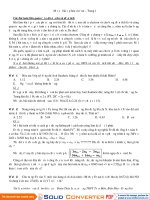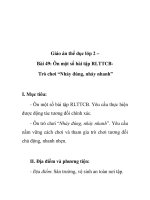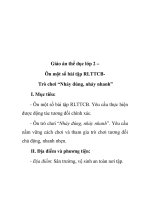Mot so bai tap doc hieu
Bạn đang xem bản rút gọn của tài liệu. Xem và tải ngay bản đầy đủ của tài liệu tại đây (110.41 KB, 10 trang )
No Kids The Secret To A Happier Marriage
A new study has found that having a child can make a couple less happy with each other.
Researchers from the University of Denver conducted an eight-year study of 218 sets of parents.
Their report is called “The effect of the transition to parenthood on relationship quality”. It is
published in the March 2009 edition of the ‘Journal of Personality and Social Psychology’. The
psychologists examined how happy couples were in the eight years after the birth of their first
child. They concluded that the first baby put a lot of stress and pressure on a marriage. Ninety
percent of couples experienced a decrease in marital bliss immediately following the birth of their
first child. Unmarried couples experienced bigger problems.
It’s not all bad news for would-be parents. Some couples in the research said their relationship was
stronger after their baby was born. Parents who were married for a long time before starting a
family were happier. Couples on higher incomes also seemed to have fewer problems. Researcher
Scott Stanley said his team’s findings did not mean children bring unhappiness in life. He said that
parents may be happier as part of a family than as a childless couple. He noted that “this type of
happiness can be powerful and positive”. Stanley also pointed out that couples who did not have
children also became unhappier with each other over time. However, he said parenthood
accelerated levels of unhappiness.
TRUE / FALSE
a. Researchers say having a child will negatively affect a marriage. T / F
b. The researchers spent eight years studying 218 different parents. T / F
c. The study looked at the impact of a couple having two children. T / F
d. Parents who weren’t married had more problems than married couples. T / F
e. The article said there was some good news for future parents. T / F
f. Richer parents were unhappier after the birth of their first baby. T / F
g. The researchers said parents could be happier than childless couples. T / F
h. Couples who did not have children stayed happy together forever. T / F
SYNONYM MATCH
1. study a. happiness
2 conducted b. kind
3. transition c. sped up
4. examined d. change
5. bliss e. report
6. would-be f. stated
7. starting a family g. hopeful
8. noted h. having children
9. type i. carried out
10. accelerated j. looked at
Vegetarian diet reduces cancer risk
A decade-long study in the United Kingdom has found that cancer is less common among
vegetarians. Health experts have always thought that a vegetarian diet is healthier than one that
includes meat. This latest research is one of the biggest studies to compare cancers in vegetarians
and non-vegetarians. The researchers tracked the health of 63,550 men and women aged between
20 and 89. They separated people into different groups – meat-eaters, fish-eaters, and vegetarians.
The research team reported a “significantly lower” number of cancers among the fish-eaters and
vegetarians compared with those who ate meat. The study suggests being vegetarian could protect
people against cancer.
The findings of the research have been published in the March 2009 edition of the ‘American
Journal of Clinical Nutrition’. Lead researcher Professor Timothy Key said his study was the first
major research to look at the link between diet and cancer. "It suggests there might be some
reduction in cancers in vegetarians and fish-eaters and we need to look carefully at that," he said.
Vegetarianism is on the increase around the world. People are becoming more and more health
conscious and are eating less meat, or cutting it out altogether. Some people choose a strict
vegetarian diet that excludes all animal products. This means no dairy products or honey. Less strict
vegetarians eat eggs and fish.
TRUE / FALSE:
a. The article talks about a 10-year-long study into cancer. T / F
b. The study in the article is the biggest ever to look at cancer and diet. T / F
c. Researchers studied the health of teenagers and centenarians. T / F
d. The study concludes that being vegetarian could benefit your health. T / F
e. The study’s findings are not yet published anywhere. T / F
f. A researcher said it was the first big study to look at a diet-cancer link. T / F
g. A greater number of people around the world are becoming vegetarian. T / F
h. Strict vegetarians should not eat cheese, yoghurt or honey. T / F
SYNONYM MATCH:
1. decade a. divided
2 common b. conclusions
3. tracked c. connection
4. separated d. ten years
5. protect e. widespread
6. findings f. aware
7. link g. followed
8. conscious h. safeguard
9. altogether i. rules out
10. excludes j. completely
Life near fast food restaurants unhealthy
New research in the USA says it is unhealthy to live in areas with lots of fast food restaurants. A
study by the University of Michigan said people who live within walking distance of fast food
restaurants have a 13 per cent higher chance of having a stroke. Lead researcher Dr. Lewis
Morgenstern and his team analyzed the social status of the 1,247 people who had strokes in an area
of Texas over a three-year period. The area was home to 262 fast food restaurants. The team
compared the stroke victims’ social status with how close they lived to the restaurants. He
concluded there was a strong relationship between the distance someone lived to fast food
restaurants and their chances of having a stroke.
A stroke is similar to a heart attack, except it attacks the brain. Strokes are among the biggest killers
in the USA. Many are the result of unhealthy eating. A diet that has a large amount of fast food and
other junk food increases the chances of having a stroke. Dr. Morgenstern’s research found that
there could be up to 33 different fast food restaurants in an area. This puts people living nearby
more at risk of a stroke. Dr. Morgenstern said he didn’t know whether it was the actual fast food
that increased the risk of stroke. He said fast food restaurants are more common in poorer
neighbourhoods where people are less educated and generally have unhealthier and more stressful
lifestyles.
TRUE / FALSE
a. A study said living near fast food reasons was bad for your health. T / F
b. People who live very close to fast food restaurants are 13% fatter. T / F
c. The study focused on an area that had 262 fast food restaurants. T / F
d. The researchers looked at the social status of people who had a stroke. T / F
e. A stroke is like a heart attack that attacks your brain. T / F
f. The study found as many as 33 fast food restaurants in an area. T / F
g. The lead researcher is 100% sure fast food leads to strokes. T / F
h. There is no link at all between education levels and risks of strokes. T / F
SYNONYM MATCH
1. live a. examined
2 chance b. like
3. status c. possibility
4. analyzed d. usually
5. close e. heightens
6. similar to f. reside
7. increases g. usual
8. up to h. nearby
9. common i. position
10. generally j. as many as
U.S. woman gives birth to eight babies
A woman in Southern California gave birth on January 27th to octuplets. It is only the second time
in US history a mother has delivered eight babies. It is also only the second time ever for all
octuplets to survive their first day. Doctors said the six tiny boys and two girls were all doing well
and breathing on their own. They all arrived nine weeks early and ranged in weight from 0.68kg to
1.47kg. The mother and the team of doctors received a huge surprise at the end of the birth – an
eighth baby. The mother believed she was going to have just seven babies (septuplets) before the
birth. After the doctors delivered babies A to G, they discovered baby H. The mother asked the
nurses: “Really? An eighth baby? How did we miss that baby?”
There are no pictures of the babies yet. The mother has asked the hospital to keep her identity a
secret. She also does not want the media to find out whether or not she took fertility drugs before
becoming pregnant. Dr Richard Paulson of the University of Southern California told reporters that
the octuplets were probably because of fertility drugs. He also spoke about the risks involved in
multiple births: “It's a risky decision to try to have all eight babies. I would not recommend it under
any circumstances,” he said. He added that the chances of having eight children naturally, without
drugs, were “unbelievably rare”. Twins occur in roughly 1 in 80 births; triplets in 1 in 6,400 births.
The likelihood of octuplets being born is 1 in 20 trillion pregnancies.
1. TRUE / FALSE
a. A woman in America has given birth to quadruplets. T / F
b. It is the first time ever that all babies survived beyond a day. T / F
c. Several of the babies need special machines so they can breathe. T / F
d. Doctors originally thought there were only seven babies. T / F
e. The mother wants to stay out of the public attention. T / F
f. A doctor said he believed the woman took fertility drugs. T / F
g. The doctor advised multiple births under special circumstances. T / F
h. The chance of having octuplets without drugs is over 15 trillion to 1. T / F
2. SYNONYM MATCH
1. octuplets a. enormous
2 tiny b. chance
3. early c. likely
4. huge d. premature
5. discovered e. advise
6. identity f. eight babies
7. probably g. found
8. recommend h. amazingly
9. unbelievably i. small
10. likelihood j. name
Cubans can now build their own homes
Times are changing quickly in Cuba. Cubans can now build their own houses for the first time in 50
years. The country's president, Raul Castro, has announced changes to help the nation's housing
shortage. For the past five decades, people had to rely on the government to provide them with
houses. There was no such thing as housing loans or a property market. The new reforms will allow
people to get loans to build their own homes. There will still be many restrictions. All new
properties must follow strict building guidelines. The government has announced dimensions for
new houses that all architects must stick to. Mr. Castro explained his decision live on television,
telling his people: "I've given you this amount of space....Now build your little home with whatever
you can."
Housing has become a serious problem in Cuba. There are now too few houses for people to live in.
Overcrowding is reaching record levels as more and more people live with their families in tiny
properties. Cuba's government has had difficulty keeping to its targets of building 100,000 new
homes per year. The situation has been made worse by three huge hurricanes that hit the island in
2008. Hundreds of thousands of homes were destroyed in the fierce winds and driving rain. One
potential Cuban homeowner, Jose Santana, was delighted with the news. "My dream to have my
own home may soon come true," he said. This may be easier said than done. The average wage in
Cuba is just $17 a month, and most building materials are only available on the black market.
1. TRUE / FALSE
a. People in Cuba are attending free house-building workshops. T / F
b. People could build their own homes 55 years ago. T / F
c. Cubans have been unable to get a housing loan for the past 50 years. T / F
d. People in Cuba are free to design their houses any way they choose. T / F
e. There aren’t enough houses in Cuba for people to live in. T / F
f. Cuba’s government couldn’t manage to build 100,000 houses a year. T / F
g. Very bad weather in 2008 added to Cuba’s housing shortage. T / F
h. Average wages in Cuba are only $170 a month. T / F
2. SYNONYM MATCH
1. quickly a. to be had
2 rely b. limits
3. reforms c. likely
4. restrictions d. depend
5. stick to e. huge
6. serious f. salary
7. tiny g. fast
8. potential h. follow
9. wage i. changes
10. available j. small









